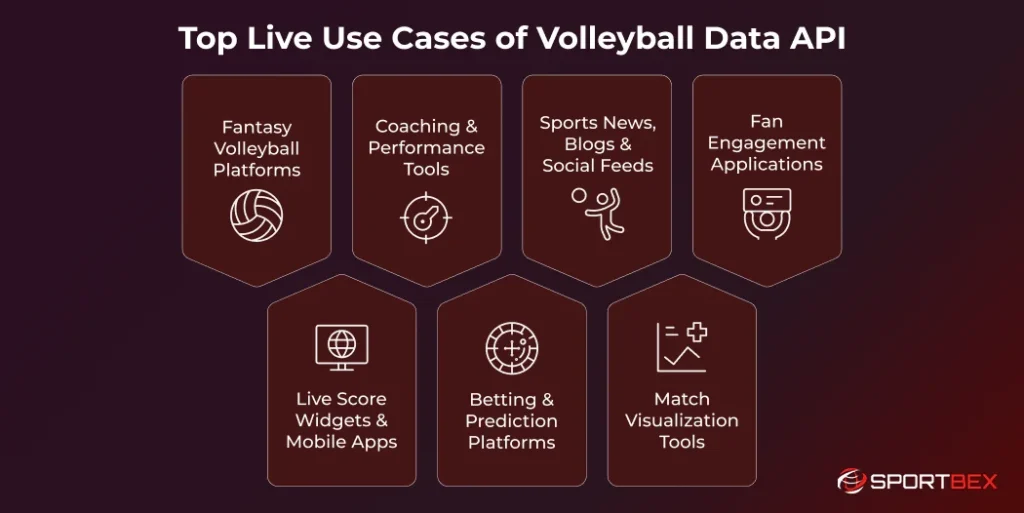From live score updates that keep fans on the edge of their seats to complex analytics powering professional coaching tools, the demand for instant, accurate information has never been higher. For developers, media outlets, and businesses in the sports industry, accessing this data is crucial for creating engaging and competitive products.
A robust Volleyball Data API is changing the way fans and developers interact with the sport. By delivering accurate, real-time volleyball data, it powers everything from fantasy sports leagues, where every spike and block counts, to sports betting applications that rely on split-second updates.
From mobile apps and sports news portals to advanced coaching software, understanding how to leverage a Volleyball Data API is key to delivering a top-tier user experience. In particular, we will highlight the Live use cases of Volleyball Data API in digital sports, demonstrating how real-time data enhances fan engagement, fantasy leagues, and analytical insights.
What Is a Volleyball Data API?
A Volleyball Data API is a specialized Application Programming Interface that provides programmatic access to a vast repository of volleyball-related data. Think of it as a structured data bridge connecting developers to live and historical information about volleyball matches, teams, players, and leagues from around the world.
Instead of manually collecting scores or player statistics, developers can use the API to request and receive this information in a standardized, machine-readable format like JSON or XML. The data provided by a Volleyball Data API is comprehensive, covering numerous aspects of the game. At a fundamental level, it includes basic match details such as team names, scores, and event schedules.
However, more advanced APIs offer much deeper insights. This can include live, play-by-play updates, individual player statistics (e.g., kills, aces, blocks, digs), team performance metrics, and historical data for seasons past. A live volleyball data API is particularly valuable because it delivers information in real time as matches unfold.
Top Live Use Cases of Volleyball Data API

A live volleyball data API is the technological backbone for a diverse range of digital applications. Its ability to provide instant, accurate data unlocks a world of possibilities for developers and businesses.
Fantasy Volleyball Platforms
Fantasy sports are a massive market, and volleyball is no exception. For these platforms to function, they require a constant stream of real-time player and match data. A Volleyball Data API is the engine that powers these games. It feeds live information on player performance, such as kills, assists, blocks, aces, and errors, directly into the fantasy platform.
During a live match, the API updates player scores in real time, allowing users to track their fantasy team’s performance second by second. This instant feedback loop is what makes fantasy sports so engaging. Without a reliable live data feed, fantasy platforms would be unable to provide this dynamic gameplay.
Live Score Widgets & Mobile Apps
One of the most common applications for a Volleyball Data API is to power live score widgets and dedicated mobile apps. Fans want to stay updated with the latest scores, especially when they can’t watch the match live. Websites, sports news portals, and mobile applications embed Volleyball Live Score widgets that display real-time scores, set results, and key match events.
These applications make API calls every few seconds to fetch the latest data, ensuring that the information displayed is always current. Beyond just scores, these apps can use the API to provide more context, such as which player just scored, updates on timeouts, or notifications for set points. The speed and reliability of the API are paramount here; a delay of even a few seconds can result in a poor user experience.
Coaching Tools
Modern coaching has become increasingly data-driven. Coaches and analysts use sophisticated software to track player performance, analyze opponent strategies, and make in-game adjustments. A live volleyball data API can be integrated into these coaching tools to provide real-time analytical capabilities.
During a match, coaches can use a tablet or laptop to see live-generated statistics and visualizations. For example, an application powered by a Volleyball API could show a heat map of where an opposing team’s attacks are originating, identify which player is being targeted on serves, or track the success rate of their own team’s offensive plays. This allows for immediate, data-informed decision-making.
Covering Every Major Volleyball League
Get live scores and stats from the FIVB Nations League, SuperLega, and more.
Betting & Prediction Platforms
The sports betting industry is entirely dependent on fast, accurate, and reliable data. For Sports Betting Websites, a live volleyball data API is non-negotiable. It provides the real-time information needed to set odds, manage live (in-play) betting markets, and settle bets accurately.
During a live volleyball match, odds fluctuate constantly based on the flow of the game. A point scored, a key player substitution, or a timeout can all impact the probability of different outcomes. The API delivers these event updates instantaneously to betting platforms, allowing their algorithms to adjust the volleyball odds api in real time. Furthermore, the API’s data integrity is crucial for ensuring fair play and maintaining trust with users.
Sports News & Social Feeds
Automated content creation is another powerful use case. Sports news outlets and media companies use the Volleyball Data API to generate articles, match reports, and social media updates automatically. For instance, as soon as a match ends, a script can call the API to get the final score, top-performing players, and key statistics.
This automation allows media outlets to publish content much faster than a human journalist could, providing timely updates to their audience. Similarly, social media accounts can be automated to post live score updates, celebrate milestones (like a player reaching a certain number of kills), or announce final results.
Match Visualization
Data visualization can make complex statistics easy to understand and visually appealing. Developers use the Volleyball Data API to create dynamic visualizations that represent the action on the court. This could include a 2D or 3D representation of the court showing shot placements, serve trajectories, or the position of blocks.
When developers integrate Volleyball API data with visualization libraries, they can create compelling narratives that go beyond simple numbers. Sports analytics websites can use them to create interactive post-match reports, allowing fans to explore the game’s key moments. For example, a user could filter to see all of a specific player’s successful spikes or analyze a team’s defensive formations.
Fan Engagement Applications
Beyond typical score apps, a live volleyball data API can power a wide range of creative applications designed to boost fan engagement. Developers can build real-time quizzes and trivia games that react instantly to match events, such as asking fans who scored the latest ace.
Second-screen experiences can also be enhanced by displaying live player stats, social media feeds, and interactive polls that fans can use while watching a match on TV. The key is leveraging the live data stream to make every interaction feel immediate and directly tied to the action unfolding on the court.
Why Real-Time Data Is Important in a Volleyball API

The ability to deliver data with minimal delay is what separates a high-quality API from a less useful one. The importance of real-time data spans across all major use cases, impacting everything from fan experience to business operations.
Instant Match Updates
At its core, the appeal of live sports is its immediacy. Fans want to know what is happening, as it happens. A live volleyball data API that delivers instant match updates meets this fundamental expectation. When a point is scored, fans using a live score app should see the score change almost simultaneously.
Any noticeable lag between the on-court action and the digital update can be frustrating and may cause users to seek out a more responsive service. This real-time synchronization creates a seamless experience, making fans feel connected to the game even if they are miles away.
Fan Expectations in Real Time
Modern sports consumption has been shaped by the instant-gratification culture of the internet. Fans are accustomed to receiving information on demand and in real time. They expect live blogs, push notifications for key moments, and social media feeds that are constantly updated during a match.
A Volleyball API must meet these high expectations. For media companies and app developers, providing a truly real-time experience is a competitive advantage. It helps build a loyal audience that trusts the platform as a primary source for live information. Failing to deliver on this promise can quickly lead to user churn.
Powering Fantasy and Betting
For the fantasy sports and betting industries, real-time data is the lifeblood of their operations. The entire business model of in-play betting relies on the ability to offer volleyball odds that reflect the current state of the game. A delay of even a few seconds could create an opportunity for arbitrage or result in inaccurate odds, leading to financial risk for the platform.
Similarly, fantasy sports platforms need to update player scores instantly to maintain the excitement and integrity of the game. A fantasy manager needs to see the points from a player’s ace reflected immediately to track their matchup’s progress. In these high-stakes environments, a reliable Volleyball API with guaranteed low latency is an absolute necessity.
Data for Smarter Coaching
In the competitive world of professional volleyball, every second counts. Coaches and analysts who use data for in-game decision-making require information that is delivered in real time. If a coach sees a statistical trend emerging, for instance, an opponent’s tendency to attack a specific zone, they need that information immediately to make a tactical adjustment.
A data feed that lags behind the live action is of little use during a match. Real-time data empowers coaches to be proactive rather than reactive, giving their team a strategic edge.
Automated Content Creation
For news outlets and media companies, speed is everything. The first to report the final score or a key highlight often wins the most traffic. Automated content creation systems, which rely on a live volleyball data API, can only be effective if the data is delivered in real time. An automated match report can be generated and published the moment the API signals the match has ended.
This allows organizations to deliver timely content to their audience without manual intervention, freeing up journalists to work on more in-depth analysis and feature stories. It’s this real-time capability that enables content at scale, a critical factor in today’s 24/7 news cycle.
Conclusion
The digital transformation of sports has unlocked unprecedented opportunities for innovation, and volleyball is at the forefront of this evolution. As we’ve seen, a live Volleyball Data API is more than just a technical tool; it is a powerful enabler of engaging fan experiences, sophisticated business solutions, and advanced strategic analysis.
It allows you to move beyond basic applications and create truly immersive products that capture the hearts and minds of volleyball fans. By partnering with reliable Volleyball API Providers, you can offload the complex task of data sourcing and delivery, freeing you up to focus on what you do best: innovating and building exceptional user experiences.
As technology continues to advance, new and even more creative applications will emerge. By embracing the potential of a live volleyball data API, you are not just building an application; you are helping to shape the future of how fans connect with and experience the sport they love.
Build a Premier Platform for Volleyball Fans
Use our fast and reliable API to create an engaging and data-rich experience.
Frequently Asked Questions
A Volleyball Data API delivers real-time and historical data such as scores, matches, stats, standings, and player details, allowing developers to power sports apps and platforms.
A Volleyball Data API works by pulling live and historical data from official sources and sending it to your app through fast, secure endpoints that update automatically.
You can build live score apps, fantasy volleyball platforms, betting tools, dashboards, analytics systems, and sports media websites using Volleyball Data API data feeds.
A Volleyball Data API saves development time, ensures accurate stats, improves user engagement, and delivers reliable real-time updates for any sports product.
Yes. Most Volleyball Data APIs offer simple documentation, sample code, and REST endpoints, making integration fast even for beginners.
Recent Blog
Why You Must Compare Live Tennis Odds Before Betting
February 3, 2026
 7 min
7 min
What Are IPL Cricket Betting and How Do They Work?
February 2, 2026
 11 min
11 min







